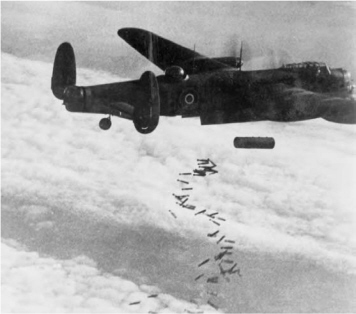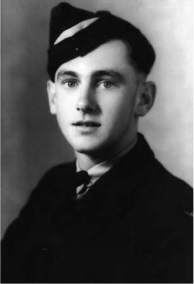
13 Holland and
Operation Hurricane
Despite the erks’ vigilance, glitches sometimes still occurred. Called at 0230 for a sortie to Fort Fredrik Hendrik, where long-range German guns protected Antwerp, Drew and Murga made a disquieting discovery while gaining height. The Gee was coded, but the necessary info for decoding had not been supplied, and the Y was u/s. David pinpointed Jig over the airfield so Murga could take a fix, and with some rapid calculation work out their course by dead reckoning. David, as usual, saw the positive side of what could have been a problem and wrote afterwards in his ops diary, This sort of thing gives us all added confidence in each other - the gen crew.
When they came out of ten-tenths cloud over the North Sea into clear skies above the target, Drew heaved a sigh of relief. He could plainly see the end of the bridge which was the aiming point, and called, ‘Bomb aimer to
Fort Fredrik Hendrik, Netherlands. Smoke on R from Target Indicators.Note bomb craters from earlier raid. October 1944. 179
pilot. Open bomb doors.’ He and Pop watched as twelve 1000 pounders and four 500s went down. But it was scary when one 1000 pounder hung up temporarily, and they were thankful to see it go. All hit very close. The kids rated the trip as quiet and disappointing, but David was satisfied with the good results their photo showed.
HAPPY VALLEY AGAIN – OPERATION HURRICANE
The next two ops were certainly no picnic. As part of Butch Harris’s strategy to disable enemy supplies, 625 Squadron Lancs were to join a mighty joint Bomber Command and US Air Force attack on the famous Thyssen steelworks, the largest in Germany, at Duisburg. Harris called for Maximum Effort in Operation Hurricane, to demonstrate to the Nazi chiefs the overwhelming superiority of the Allied Air Forces. The RAF sent off 1013 aircraft, including 519 Lancasters in the first wave, with a second wave of 1005 two hours later including 498 Lancs.
At Kelstern, 32 crews were on Battle Order 178. Woken by orderlies at 0215 on Saturday 14 October, there were groans and rude comments when they heard their daylight destination. ‘That bloody Happy Valley again! In daylight, too.’
The Ruhr certainly held no attraction. Drew wrote, So here we are on ‘the effort’, though I would just as soon be out of it, while David wrote with resignation, Our likes and dislikes have no effect on Butch Harris’s policy and strategy.
As the weather was fairly good, there was to be no Pathfinder flare marking the target. The crews were to rely purely on visual bombing. Extra photographs of the steelworks, as well as the usual topographical and target maps, were provided to assist the bomb aimers. J Jig took off on schedule at 0640 hours loaded with twelve 1000-pounders and four long-delay 500s.
For the Kelstern crews the op got off to a terrible start. As they taxied round the perimeter track, they saw one of the Lancs ahead trying to return to the runway with an engine on fire. But it did not quite reach it. They saw five chutes open as it was losing height. It crashed on a nearby farm. With a horrendous explosion the bombs went up. As the other crews took off, everybody was thinking about their friends who had gone in with their burning kite.
Climbing through high cloud to 18 000 feet, icing became a problem, slowing them down. But Jig arrived just in time over the target and met heavy flak which put holes in the port wing. An aircraft blew up about 50 yards ahead, showering Jig with debris which punctured the metal skin. The computer box was u/s, so bombs had to be dropped using manual settings. Because of the heavy pall of smoke hanging over the steelworks, the buildings could not be identified. Drew decided, ‘I’ll drop my lot in the centre of the pall.’ After watching the long-delays go down, he carried out his check of the bomb bay. No hang-up this time, thank God. He gave the order to close the bomb doors and they could turn away. But a mistake in the course setting took them even further over the target, until David spotted the error and speedily rectified it, much to everyone’s relief.
‘Sorry, Skipper,’ Murga muttered. ‘I won’t make that error again.’
‘Thought we would never get out of it,’ Pop said afterwards.
For the first time they saw ‘scarecrows’, six of them, which they had been told were an enemy device, an aerial flare which simulated exploding aircraft, designed to undermine morale. Drew thought they were aircraft and put on his parachute in readiness for baling out, but David wondered. It seems that the chiefs of Bomber Command hoped that if their crews believed they were only seeing enemy devices, they would not be so stressed by the sight of what were in fact RAF planes going down in flames.
On the homeward flight the cloud base was very low, which necessitated breaking through out to sea, then turning in to Louth at 200 feet.
‘Look out for your favourite spire, Skipper!’ Boz called from his vantage point.
As Kelstern was 400 feet up on the wolds, they climbed rapidly to come in almost at ground level.
‘Glad we haven’t got a duff pilot,’ the crew agreed.
They had been airborne for four and three-quarter tense hours and they were more than ready for a meal and longing for a kip.
But as they arrived in dispersal they heard an ominous Tannoy message: ‘All armourers report to the bomb dump.’
Rumours began to fly immediately.
Bomber Command had just dropped 4500 tons of bombs on Duisburg. It was a record day raid. Thirteen Lancs and two Halis had been lost. Wasn’t that enough? No. Not for Butch Harris. Operation Hurricane had not blown itself out yet. He had already ordered a second raid to follow that night. The pre-flight meal was scheduled for 1730 and the briefing for 1815. ‘What does he think we are?’ men grumbled. ‘Robots?’
After lunch, many, including Jig’s crew, went to snatch

Lancaster dropping bombs, a cookie and incendiaries (AWM neg. no. 12293)
some sleep. But David spent the time checking the work on Jig. Noticing a large fuel load, he knew they were in for another long trip.
At the briefing they were told that their target was again Duisburg, a city of 450 000, the world’s largest inland river port. The aim was to remove it from the map. ‘No wonder Butcher has earned his nickname,’ some of the men were heard to mutter.
Five aircraft of 625 Squadron were to go in as part of a separate smaller attack two hours after the first major wave. On hearing that Jig was one of these, Drew said, ‘I felt like howling.’
It was the last straw when all take-offs were delayed by one and a half hours. So the hunt was on to find a place to catch a bit of shut-eye. They finally took off thirty minutes after midnight with their deadly load, twelve 1000-pounders and four 500s.
Over 150 miles from the target the glow was visible, and it spread even further as they approached. Numerous fires were merging into one huge conflagration. The whole city was like a writhing mass of bloody entrails, a seething mass of flames. Despite this, flak was intense and searchlights swept the sky relentlessly. After dropping its load, Jig was almost ‘coned’ by them - a sitting duck. But David put the nose down to pick up speed and headed for home. Drew reported that the clock registered more than 210 miles per hour, But it wasn’t anywhere near fast enough for me. 310 would have been better. Alone and vulnerable, they had to run the gauntlet along a lane of fighter flares from three JU88s and had to take evasive action from one. When the Junkers saw Jig prepared for its attack, it sheered off in search of easier prey, to the relief of everyone on board Jig. They were glad to rejoin the stream over the French coast. After four hours and thirty-five minutes flying, the weary crew landed thankfully at Kelstern at 0505. David wrote, I have never appreciated bed more, having been out of it for twenty-nine and a half hours. Two trips in one day make one excessively tired.
Cyril’s memory of the raid was a complete blank. Birdy said, ‘I was too tired to be scared, but was worried about my night vision from searchlights.’ Boz said, ‘I was weary and not at all happy when the fighter made a pass at us.’
Pop’s comment summed it up: ‘The outstanding feature was the terrific red glow from previous attacks.’
All 625 Squadron’s aircraft returned, but five Lancs and two Halis were lost from the main force. Over 10 000 tons of bombs had been dropped in the two raids.
David wrote, I feel I have now avenged Frank, who was killed over this target in May.
But there had been another death, though David did not know of it. Peter was a Hali pilot.

Peter Lord as trainee